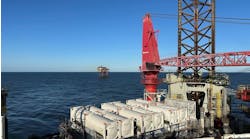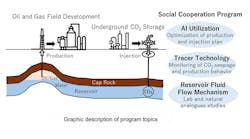Improved business environment can help UK cut offshore emissions, report claims
Offshore staff
LONDON — Britain’s offshore oil and gas operators cut their overall production emissions to 14.28 MM metric tons of CO2 in 2022, according to industry association Offshore Energies UK (OEUK).
This represents a 14% drop compared with the 19.9 MMt recorded in 2018, OEUK’s Emissions Report 2023 found.
And the sector has halved its flaring and venting and cut methane emissions by 45% compared to 2018. All the reductions are said to be in line with targets agreed under the North Sea Transition Deal with the UK government, under which the industry committed to reduce its emissions progressively and by 50% by 2030.
To date, reductions have come mainly from operational improvements, process optimization and decommissioning of older facilities,
At the same time, the report finds the UK’s carbon footprint will rise by 50 MMt of CO2e by 2050 if there is no new investment in domestic oil and gas production, due to an increased reliance on imported LNG from countries less committed to limiting the environmental impacts of production.
In a best-case scenario of sustained investment in domestic oil and gas production, the UK industry could still supply 50% of the Britain’s oil and gas needs by 2030, the authors suggest. If that happened, the sector could halve its emissions by 2030, achieve net zero by 2050, and continue to develop solutions for wind, hydrogen and carbon capture.
Most of the UK offshore sector’s emissions relate to generating power for offshore installations, including safety systems, plus electricity and heat for offshore personnel.
While further emissions reductions will rely on major investments such as offshore electrification, these solutions will only be viable with assured access to the National Grid, OEUK warned, along with an environment that encourages investors to support construction of wind farms.
The association calls for the following policy actions:
- Make the UK an attractive destination for investment in offshore energy. The Energy Profits Levy, it says, is hampering operator’s attempts to secure long-term investments in production facilities and the infrastructure needed to electrify offshore operations.
- A whole-system approach to decarbonization, with clear accountabilities for the industry, regulators, and government, to ensure decarbonization of offshore facilities is timely, consistent with delivery of emissions targets, and reflecting the wider business environment.
- Ensure UK oil and gas production facilities are viewed as part of a wider integrated energy system, with a cross-sector approach that aligns with other regulators’ remits.
- Ensure the UK Emissions Trading Scheme (ETS) supports progressive decarbonization and does not lead to premature shutting down of activity. The volatility of the UK ETS scheme, OEUK says, has made it harder to plan long term investments.
OEUK sustainability and policy director Michael Tholen said, “The decarbonization of our sector, and indeed the entire UK economy, will rely on supportive energy policy across the whole energy landscape, so we welcome any action from government that aims to attract investment and accelerate our drive to net zero.”
10.12.2023



